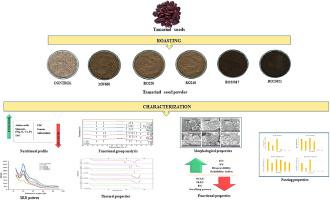Effect of roasting on physicochemical, functional, thermal, pasting, and structural properties of tamarind seed powder
引用次数: 0
Abstract
The impact of different roasting conditions on the nutritional profile, physical, functional, thermal, pasting properties, morphology, crystallinity, and functional groups of tamarind seed powder (TSP) was investigated. Roasting treatment enhanced ash, carbohydrate, fat, and flavonoid content (2.21 to 11.93 mg QE/g) while significantly reduced protein, fiber, phenol content, tannin (2.72 to 1.36 mg TAE/g), antioxidant activity, and physical characteristics like bulk density, tap density. The concentrations of minerals like Mg, K, Ca, and P (3006.00, 8313.85, 482.44, 2723.78 mg/kg) and essential and non-essential amino acids were significantly enhanced by roasting. The roasted TSP exhibited a significant difference in pasting and functional properties compared to the control powder. The proportion of crystallinity in the roasted powder decreased according to the XRD patterns. The SEM micrographs revealed slight modifications in the morphology of TSP after roasting. According to our outcomes, the enhanced nutritional content of roasted TSP has excellent potential for usage as a food ingredient with added value.

焙烧对罗望子种子粉的理化、功能、热、粘贴和结构特性的影响
研究了不同焙烧条件对罗望子种子粉(TSP)的营养成分、物理、功能、热、粘贴特性、形态、结晶度和功能基团的影响。焙烧处理提高了灰分、碳水化合物、脂肪和黄酮类化合物的含量(2.21 至 11.93 毫克 QE/克),同时显著降低了蛋白质、纤维、酚含量、单宁(2.72 至 1.36 毫克 TAE/克)、抗氧化活性以及体积密度、水龙头密度等物理特性。通过焙烧,镁、钾、钙、磷等矿物质的浓度(3006.00、8313.85、482.44、2723.78 毫克/千克)以及必需氨基酸和非必需氨基酸的浓度均显著提高。与对照粉末相比,焙烧过的 TSP 在粘贴性和功能性方面表现出明显的差异。根据 XRD 图谱,焙烧粉末中的结晶比例有所下降。扫描电镜显微照片显示,焙烧后 TSP 的形态发生了轻微变化。根据我们的研究结果,焙烧过的 TSP 营养成分得到了提高,具有作为食品配料使用的巨大潜力和附加值。
本文章由计算机程序翻译,如有差异,请以英文原文为准。
求助全文
约1分钟内获得全文
求助全文
来源期刊

Food chemistry advances
Analytical Chemistry, Organic Chemistry, Chemistry (General), Molecular Biology
CiteScore
1.90
自引率
0.00%
发文量
0
审稿时长
99 days
 求助内容:
求助内容: 应助结果提醒方式:
应助结果提醒方式:


